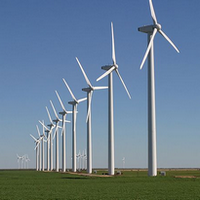This is Part IV in a four-part series. Part I examined the follow-up agreement to the Kyoto Protocol. Part II examined the REDD+ agreement. Part III examined financial assistance. And Part IV examines technology transfers and adaptation.
CANCÚN, Mexico -- In the past 10 years, technology developments in the environmental sector have progressed significantly. Solar panels now have the capacity to power entire regions of Germany. Wind turbines provide small to medium-sized cities across the world with their energy needs. Geothermal heating is a functional reality, while methane captured from modest-sized landfills can offer electricity to thousands of nearby homes. And newer ideas such as harnessing tidal power and run-of-river hydropower dams continue to make significant progress. Even carbon storage and sequestration (CSS) seems potentially viable in the foreseeable future.
However, plotting a global map of these projects would rapidly reveal a very apparent trend: The vast majority operate in a handful of developed countries. Equally important, developers of these technologies reside almost exclusively in Europe, North America and along Asia's east coast. How to expand the reach of these technologies, and the knowledge that creates them, played a major role at the U.N.'s annual conference on climate change in Cancún, Mexico, in December 2010.

